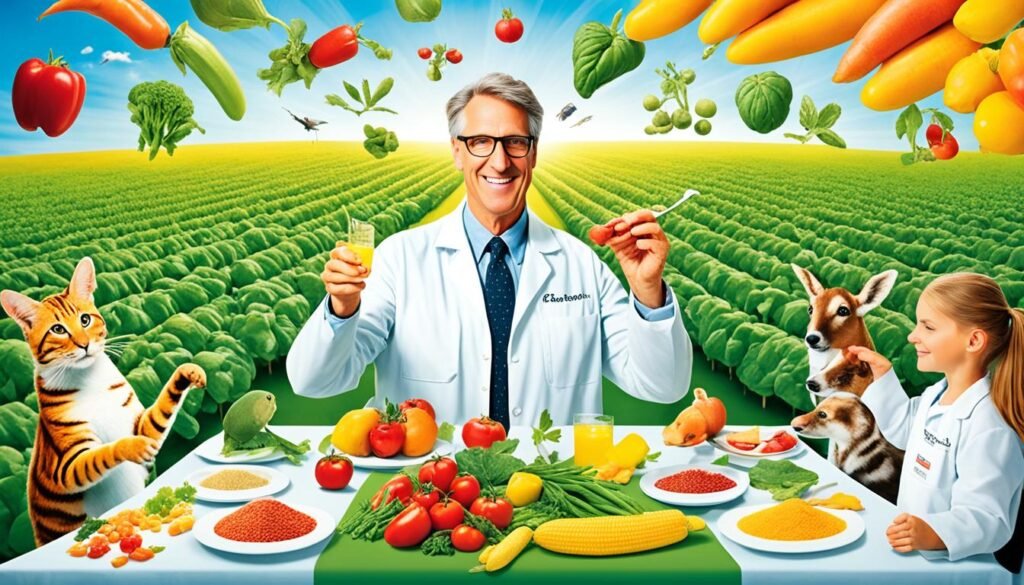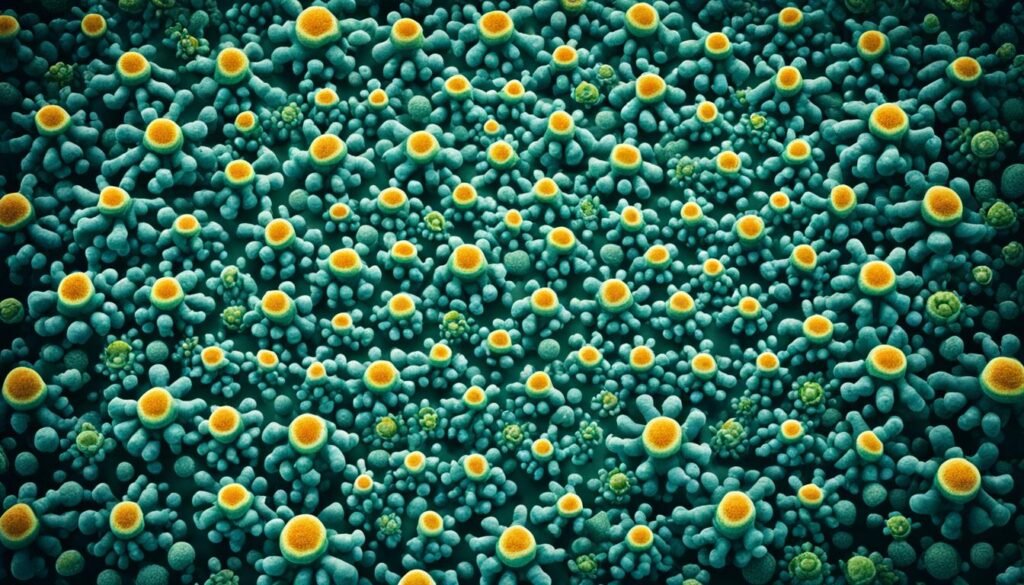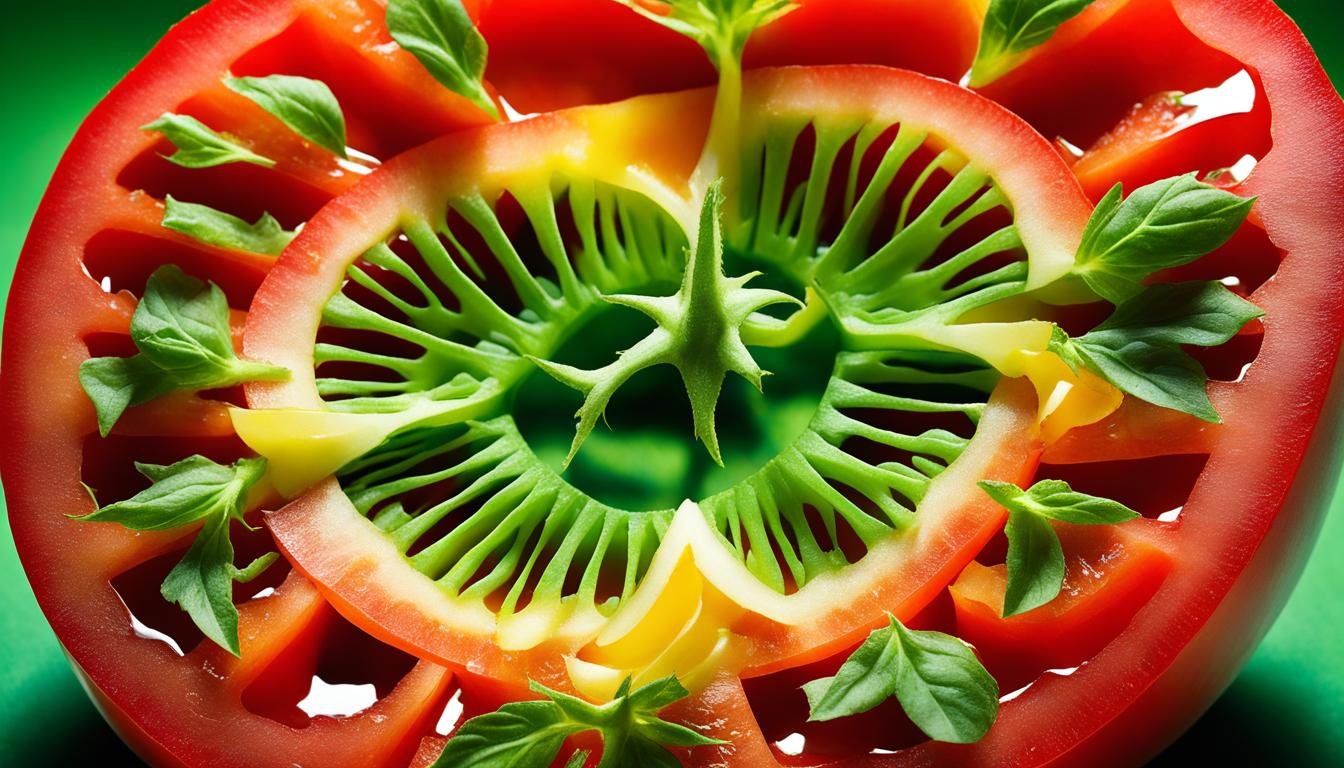A big part of today’s processed foods have genetically engineered (GE) ingredients.1 This means many Americans, from infants to adults, eat these foods daily without knowing.1 What’s more, the U.S. Food and Drug Administration (FDA) doesn’t make companies label or test these products for safety before they’re sold. This situation puts consumers at risk, making them test the safety of many GE foods without being aware they are doing so.1
Genetically engineered foods have many health dangers. Adding foreign genes can make the plant unstable and maybe create new toxins.1 Even though FDA scientists warned about this possibility, saying it could lead to more harmful toxins or new ones, the FDA didn’t pay enough attention.1
There’s a risk of new allergies from GE foods too. This happens because allergens can move from one food to another and new proteins might cause different allergic reactions.1 The FDA knew about this issue, thanks to its scientists, but chose to do nothing about it.1
GE foods with antibiotic genes could also harm public health by making some medicines less effective against diseases.1 Because of this danger, the British Medical Association wants to stop using these genes in GE foods.1
Key Takeaways
- A significant percentage of processed foods contain genetically engineered ingredients, yet consumers are unaware due to lack of labeling.
- Genetic engineering creates inherent health risks, including genetic instability, new toxins, and increased allergenicity.
- Antibiotic resistance marker genes in GE foods pose a public health threat by reducing the effectiveness of important antibiotics.
- FDA scientists have warned about the potential dangers of GE foods, but their concerns have been ignored by the agency.
- Consumers are effectively being used as “guinea pigs” to test the safety of dozens of gene-altered food products.
Introduction to Genetically Modified Foods
Genetically modified (GM) foods are made through genetic engineering. Scientists combine genes from different living things. This creates new types of plant, animal, or microbe genes that are not natural.2
What are Genetically Modified (GM) Foods?
GM foods come from organisms with altered DNA. This change happens through genetic engineering. Genes from one species are put into another. This makes new combinations that wouldn’t exist otherwise.2
Prevalence of GM Foods in the Food Supply
Many processed foods in the U.S. have genetically engineered parts.2 Over 90% of some crops like sugar beets, canola, soybeans, and corn are GMO.2 The U.S. sells many GMO crops including sugar beets, canola, corn, potatoes, soybeans, papayas, and apples.2
Lack of Labeling and Safety Testing Requirements
Consumers can’t tell if their food has GMOs because it’s not labeled.2 The FDA doesn’t need safety tests for these foods before they’re sold. So, people are unknowingly testing these foods’ safety.2 The FDA hasn’t proven genetically engineered foods are safe. This lets the biotech industry sell and promote them without showing they’re safe.2
Potential Health Concerns of GM Foods
GM foods have several health risks. Genetic engineering can make the genome unstable, creating new toxins.2 FDA scientists warned about this problem. They said new toxicants might appear. But, the FDA didn’t take it seriously.2
Toxicity and Genetic Instability
The genetic process can change a food’s genetic makeup. It might make it create new toxins or change toxin levels.2 This worries us because we might eat harmful things without knowing.
Allergenicity and Novel Proteins
GM foods could introduce new proteins. These might cause allergies in people.2 By adding genes from different species, we might eat proteins new to us. This could cause more food allergies to start.
Antibiotic Resistance
Some GM foods have genes for antibiotic resistance. This is dangerous for public health.2 The problem is, these genes can move to other organisms. This might make medicines not work as well against diseases.
The risks of GM foods are real. They include causing illnesses, allergies, and making antibiotics less strong. Testing GM foods for safety is crucial. Also, we must label them clearly. This is important for keeping us safe.2,3

Immuno-suppression and Organ Damage
Some worry about the impacts of eating genetically modified (GM) foods. Studies say they might cause issues like fewer immune responses and harm to organs. For example, a major study in The Lancet showed rats had big problems with their bodies after eating GM potatoes with a special bug-killing ability.1 Despite pushback from the GM food industry, 22 top scientists say the study’s findings on health issues are true.1
These issues make us think hard about the safety of GM foods for our health. Because gmo labeling regulations are not very strict, most people don’t know the risks when they pick their food. Learning more about the dangers of genetically changed food is very important, especially how it might affect our health.
Carcinogenic Effects and Hormonal Disruption
In 1993, the FDA approved genetically engineered rBGH. This recombinant Bovine Growth Hormone is in dairy products from treated cows. These products have higher levels of IGF-1, which may lead to breast, prostate, and colon cancers.4 The FDA didn’t think about these cancer risks before giving rBGH a green light.4
Increased IGF-1 Levels and Cancer Risk
Debates on genetically engineered food focus on their cancer risks and impact on hormones. Dairy from rBGH-treated cows has more IGF-1, raising cancer risks.4 Studies show a link between high IGF-1 levels and more breast, prostate, and colon cancers.4 But, the FDA didn’t seriously think about this when they approved rBGH.4
The GM food industry praises the benefits of genetic engineering. But, there’s still a big worry about cancer and hormones from some GM crops.4 Learning more about the good and bad of genetic engineering is key. We must have strict, unbiased safety checks and clear rules to keep people and the earth safe.4,5

Nutritional Impacts of GM Foods
Supporters say GM foods help to grow more crops and use less pesticide62. But, many worry about how this affects the food’s nutrition. Changing genes in crops can really change the nutrition it offers.
Altered Nutritional Composition
Research shows GM soybeans and corn have less nutrients and different nutrition than non-GM kinds.6 This makes people wonder if GM foods are as nutritious as others we’ve known for years.
Reduced Digestibility and Bioavailability
GM foods might not be as easy for our bodies to break down and use.3 This could lead to not getting enough nutrients from the food we eat.
The conversation about safety and ethics around GM foods is ongoing2. It’s crucial we pay attention to the nutrition issues they can bring. We must make sure the food we eat helps us stay healthy.
Environmental Impacts of GM Crops
GM crops have some good sides but also come with big risks. They can mess up the balance of nature by making some plants and animals disappear. This happens when GM crops are designed to resist pests or weed killers.7
Biodiversity Loss and Ecosystem Effects
When we change crops through genetics, it’s not just the crops that are affected. Bugs, tiny living things, and animals can also suffer. Our environment gets hurt too, as the natural teamwork between plants and creatures gets thrown off by these changes.7
Herbicide and Pesticide Resistance
Using more weed killers and bug sprays because of GM crops is creating big problems. Weeds and bugs are becoming unstoppable by these chemicals, harming the environment even more.7 GM crops that can with stand a weed killer called glyphosate have helped create many weed types that are now unkillable by it. This has happened in places like the US, Brazil, and Canada.7 By March 2020, there were 48 kinds of weeds around the world that aren’t affected by glyphosate, even though they didn’t come from GM crops.7
Farmers using GM crops have been told to mix up the types of weed killers they use. They should also use ways that disturb the soil less to deal with weeds. Studies over more than 20 years show that GM crops with built-in pesticides don’t hurt the bugs that usually eat the bad bugs.7
It’s very important to talk about GMOs and their effects on the planet. We need to think hard about how we grow our food, making sure it doesn’t harm our environment in the long run.7

Regulatory Failures and Lack of Oversight
The FDA doesn’t make GM foods companies test their products for safety. This is even though its own scientists warn about risks.1 They decide things about GM foods without enough science or public talks, giving in to industry pressure.1
Industry Influence on Regulatory Agencies
The FDA allows the biotech industry to sell many GM food items without checking if they’re safe enough.1 This means that many Americans eat these foods every day without knowing they’re genetically changed.1
Inadequate Safety Testing Protocols
The FDA should make sure GM foods are safe before they hit the shelves. But it doesn’t, even though these foods bring new dangers. They could have more toxins or new allergens because of genetic changes.1 The FDA ignores its scientists’ warnings and doesn’t put in place the right safety steps before letting GM foods be sold.1
There needs to be more transparent and independent checks of GM foods. GM food regulations, gm food impact on environment, and gm food impact on health must be looked at carefully8. Dealing with gmo safety concerns and having clear gmo labeling regulations is crucial to keep people safe and to make people trust food more.9

genetically modified foods pros and cons
The discussion about genetically modified (GM) crops and foods keeps going. It helps to look at the good and bad points. Those who like GM say they make more food, use fewer chemicals, and can even grow in tough places.6 They believe the science proves GM food is safe, and worries are just ideas.6
Potential Benefits of GM Crops
GM crops can help make more food and fight hunger worldwide. They can produce larger harvests,2 which is great in hard areas. These areas might face dry weather, bugs, or bad soil. Using fewer pesticides might also help our planet.6
Risks and Drawbacks of GM Technology
Yet, some people worry about GM foods. They fear it could be unsafe to eat and bad for our world. They’re concerned about new types of allergies or poisons and the risk of creating superbugs with strong resistance.2 Others worry about losing nature variety and dealing with hard-to-control weeds and bugs.6
In many places, GM foods don’t have to say they’re GM on the label. This makes some shoppers mad. They want to know what they’re buying.6
The talk about GM foods is deep and covers many areas. There are good points to think about on both sides. It’s key to think about the good and bad and to protect people and nature as we use this tech.
Public Perception and Consumer Concerns
Many people still doubt the safety of GM crops, despite what science says. This doubt is strong in places like Europe. There, people push back against genetically modified food. The main reason is the food doesn’t have to say if it has GM parts in it. So, it’s hard for people to know what they’re eating.10
Lack of Transparency and Labeling
In the U.S., only a small amount of people think most of their food has GM parts. But a big portion thinks some of their food does.10This confusion happens because GM foods aren’t clearly marked. This lack of clear information makes people unsure about what’s really in the food they eat.2
Consumer Resistance and Demand for Non-GM Foods
Many Americans think GM foods could be bad for health. Even more say they’re neither better nor worse.10 Because of this doubt, people want foods that aren’t genetically modified (non-GMO). This includes organic foods. They believe these options are better.10
People who know a lot about GM foods think they eat mostly GM foods. This group is much bigger than the one who knows little about GM foods. They often say their food has GM ingredients. Not many who know little about GM foods think this way.10
People are worried about the safety and effects of GM foods. This worry makes them want non-GMO foods more. As people learn more, they might change what they want to eat. This could lead to more choices without GM foods in stores.
FAQ
What are Genetically Modified (GM) Foods?
How prevalent are GM foods in the food supply?
Does the FDA require safety testing for GM foods?
What are the potential health concerns with GM foods?
Can GM foods have negative impacts on the immune system and organ development?
Are there cancer risks associated with GM foods?
Can GM foods have reduced nutritional value?
What are the environmental risks of GM crops?
Why is the FDA’s approach to regulating GM foods concerning?
What are the potential benefits of GM crops?
Why is there public skepticism and resistance to GM foods?
Source Links
- https://www.centerforfoodsafety.org/issues/311/ge-foods/ge-food-and-your-health
- https://www.medicalnewstoday.com/articles/324576
- https://www.ncbi.nlm.nih.gov/pmc/articles/PMC3791249/
- https://sphweb.bumc.bu.edu/otlt/MPH-Modules/PH/GMOs/GMOs5.html
- https://www.ncbi.nlm.nih.gov/pmc/articles/PMC3615871/
- https://www.healthline.com/nutrition/gmo-pros-and-cons
- https://www.montana.edu/hhd/graduate/dietetics/blog_posts/GMO_environment.html
- https://www.ncbi.nlm.nih.gov/books/NBK424533/
- https://www.ncbi.nlm.nih.gov/pmc/articles/PMC5161003/
- https://www.pewresearch.org/internet/2016/12/01/public-opinion-about-genetically-modified-foods-and-trust-in-scientists-connected-with-these-foods/

